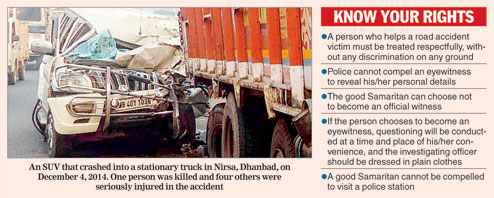Road accidents happen. But, Jharkhand must no longer fear to lend a helping hand to victims because police or hospitals can no longer harass eyewitnesses on the pretext of investigations and otherwise.
The state government on Friday formally adopted the Good Samaritan Rules, which were notified by the Union road transport ministry on January 21 to safeguard the interests and privacy of people who come forward to help accident victims. The transport department, as part of its publicity drive, issued formal advisories in select vernacular dailies informing citizens about the central rules.
Transport commissioner Sandeep Singh told this correspondent that they had on Thursday written to the DGP, as well as SSPs/SPs and deputy commissioners of all districts, to ensure strict implementation of the rules.
"Detailed standard operating procedures on how to deal with those who help accident victims or eyewitnesses have been sent to all the 24 districts for implementation. Although these are central rules, prodded by the Supreme Court, Jharkhand has now adopted them. The state can further amend and improve these rules," he said.
So, is Jharkhand considering a fresh set of rules?
"At the moment, we shall follow the central rules. In the future, government may improvise on them. People can go through the salient features of Good Samaritan Rules on the Union road transport ministry or NGO Save Life Foundation websites," Singh said.
Save Life Foundation was the first to file a PIL in the apex court in 2012, stating that most road accident deaths take place in India because bystanders or passers-by do not come forward to rush victims to hospital in apprehension of legal and procedural hassles.
According to the central rules, a good Samaritan must be treated respectfully and without any discrimination on any ground. A person who informs police about an accident, fatal or otherwise, must not be compelled to reveal his/her personal details. The good Samaritan can choose not to become an official witness. If the person chooses to become an eyewitness, questioning will be conducted at a time and place of his/her convenience, and the investigating officer should be dressed in plain clothes. A good Samaritan cannot be compelled to visit a police station.
An official in the Ranchi district transport department said the formal adoption of these rules assumed significance in Jharkhand because at least two minor or major accidents take place in the state every day. He, however, maintained that the onus of successful implementation lay on district authorities.
"The first step is to sensitise policemen who actually do all the ground investigation and record data. Their awareness level and manners are usually poor. Behavioural lessons are important here. We plan a series of seminars soon," the official said, requesting anonymity.
Besides policemen, sensitising medical practitioners is also imperative. "They should deem it their priority to admit a victim without seeking admission fee or police case. We shall ask all hospitals and health centres to prominently display the rules on their premises in all common languages. There should be pictorial representations to facilitate understanding," the transport official added.
Will you help a victim of road accident in Jharkhand? Tell ttkhand@abpmail.com












